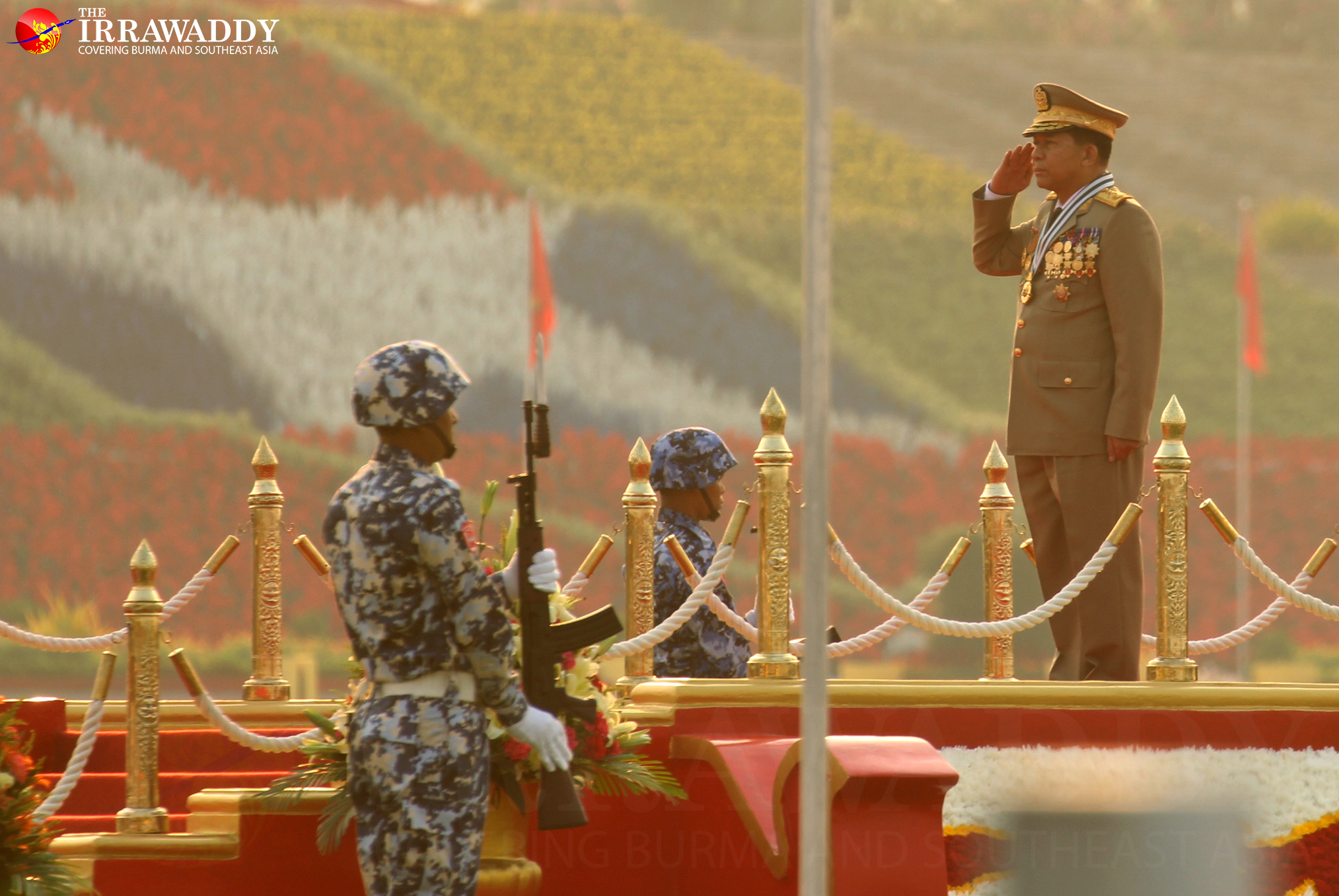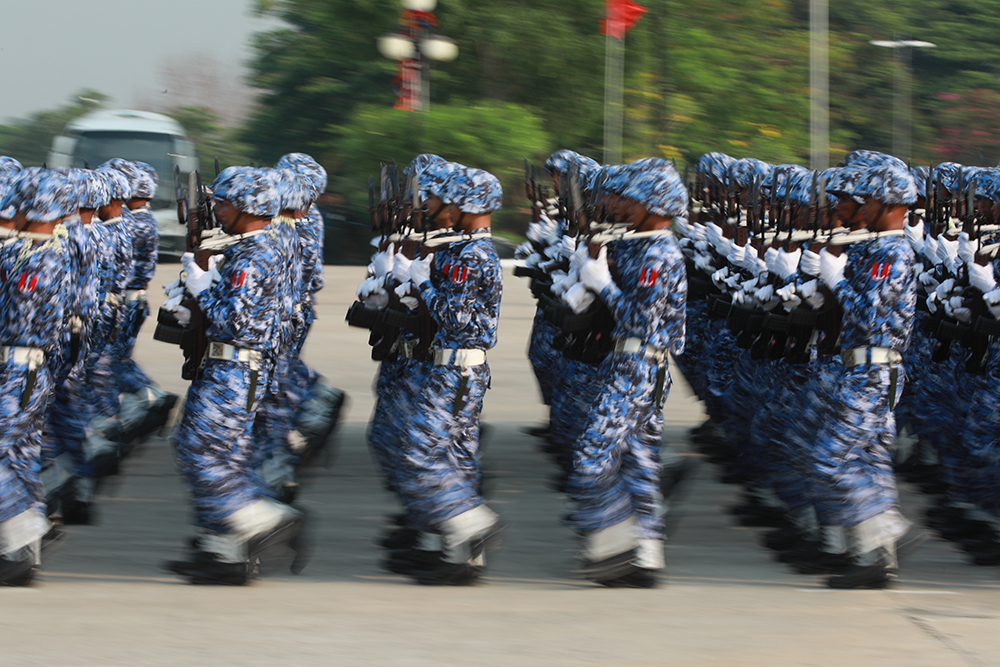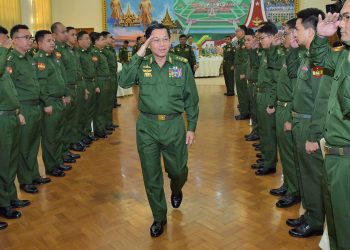Late on the evening of March 1, 1962, General Ne Win was among the honored guests at a Chinese ballet performance in Yangon. The general enjoyed a drink as he took in the show. Guests recalled seeing the general and his bodyguards return home soon after the performance ended.
But this relaxed scene was a façade. In the early hours of March 2, troops dispatched by the general arrived at the residences of government leaders and detained them. At 8:50 a.m. he went on the air to announced a military takeover of the government. Not even Ne Win’s close subordinates—including Brigadier General Aung Gyi, who would become the No. 2 in the Revolutionary Council formed shortly after the coup—had prior knowledge of the power grab.
The current rumors that a coup is imminent in Myanmar and the rising political tensions are troubling, but let’s hope the generals aren’t planning to go that far. They will surely think twice before they do anything to drag the country back to the stone age. They would only be digging their own graves.
Putting aside rumors, and looking beyond the headlines we consume daily in newspapers and online, including in this publication, a levelheaded senior military officer told me this week that if the military was planning a coup, they would never signal it in advance. Understood.
Nonetheless, as a foreign friend who worked in Myanmar for decades put it, Myanmar (or Burma) is never predictable; watching the country’s political drama unfold, one must expect the unexpected.
The expat, who now lives outside Myanmar, said to me: “It is painful to watch this drama—the suspense is killing me.” But I believe every crisis presents opportunities, and I hope the same will be true of this saga.
In a statement, Western embassies in Yangon affirmed their “support for Myanmar’s democratic transition and efforts to promote peace, human rights and development in the country.”

They continued, “We look forward to the peaceful convening of the Parliament on February 1 and the election of the President and speakers,” adding, “We oppose any attempt to alter the outcome of the elections or impede Myanmar’s democratic transition.” The statement reflects the aspirations of the majority of Myanmar’s people.
One ironic consequence of the military’s threatening posture is that Daw Aung San Suu Kyi will only receive moral support and sympathy from the public at home and abroad; her status and the ruling party’s image will be elevated without her having to lift a finger.
A business tycoon who in the past worked with the military regime—and enriched himself in the process—this morning summed up his feelings in one word “outrage”. He said he was disgusted watching the political events unfold in Myanmar. “It is ugly and I have nothing much to say,” he said before hanging up the phone. One can see his point of view.
Last night, Daw Aung San Suu Kyi reportedly held a series of meetings with party loyalists at her residence to discuss the crisis.
A levelheaded senior military officer told me this week that if the military was planning a coup, they would never signal it in advance.
She is said to have shared her objections to the military’s demands—for a vote recount, the postponement of the coming Parliament session from Feb. 1, and the abolition of the Union Election Commission—and to have discussed possible scenarios for dealing with the unfolding situation.
But this is a woman who spent years under house arrest and in detention, survived violent attacks by thuggish mobs when traveling in the countryside, and endured public humiliation. Today, she is the leader of the country. One would assume that at 75 the State Counselor would be calm and patient. But let’s think positively. Even by the time she went to bed last night she must have been silently thanking her adversaries in the military, or whoever it might be, as they have somehow managed to make her and her party sympathetic figures once again. Over the decades, she has had no shortage of enemies who inadvertently promoted her cause and her status at home and abroad. She should be sending flowers to them in gratitude.
At 6 a.m. this morning, a friend sent me a chat message expressing concern that a coup would only make life more difficult for people who are already experiencing economic hardship and poverty, while struggling with the effects of the pandemic.
My friend is not a journalist—just an informed citizen sharing his speculations. He wanted to talk about how Myanmar’s neighbors and allies would respond in case of a coup: “Russia will win if there is a coup. The army plans to buy more hardware from Russia.”
I said, “Russia doesn’t care.”
He wrote: “China will lose….”
And… “Business owners are going to lose.”
Followed by… “Crony businessmen and their kids would suffer from a coup.”
Then… “Myanmar will become an unstable partner in the BRI,” (referring to China’s massive infrastructure development plan, the Belt and Road Initiative).

This month, Myanmar received high-level visits from China, Russia and Japan – all three are Myanmar-friendly governments. Chinese Foreign Minister Wang Yi was here to sign agreements on the economy, trade and technical cooperation with the aim of speeding up the implementation of BRI projects in Myanmar. Russia came to sell military hardware but nothing else. “But did Russia embolden the generals?” my friend quizzed me.
I replied that not even China, Myanmar’s giant neighbor and key ally, would accept a coup. However, my friend said, despite its desire to see stable leadership in Myanmar, Beijing will put its own interests first at the end of the day. I had to agree.
Then my friend turned the discussion to social media, where many netizens were expressing opposition to the military’s interference in politics amid the rumors of an impending coup.
He was worried that there would be a crackdown on telecom infrastructure and social media, or even a temporary shutdown of internet access, such as was recently imposed in Chin and Rakhine states.
“People will revolt,” he wrote. “They may not revolt for democracy. But people will revolt if their mobile phones are taken away from them.” In the meantime, the NLD isn’t taking any chances with their communication devices; top party leaders have reportedly instructed MPs to deactivate their SIM cards in a preemptive measure in case they are arrested, and to erase any sensitive data from their devices.
One ironic consequence of the military’s threatening posture is that Daw Aung San Suu Kyi will only receive moral support and sympathy from the public at home and abroad.
I told my friend to calm down. I know that many military officers and their families are addicted to social media and Facebook. If the internet were shut down, they would be the ones to revolt, let alone the civilian population!
To comfort my colleague, I shared a rumor concerning former regime leader Senior General Than Shwe.
Now in his late 80s, when not engaging in his hobby of palm reading, it is said that the once paramount leader enjoys surfing Facebook every day. “Then we are safe,” my colleague said. “If he likes Facebook, it won’t shut down!” I joked that the once powerful regime leader still monitors events from behind the throne and continues to pull strings via Facebook (we’re lucky that he doesn’t share Donald Trump’s tweeting addiction), so we’re safe.
In its modern history, Myanmar has seen three military coups. These occurred in the pre-smartphone, pre-social media era, in 1958, 1962 and 1988.
The generals then were fortunate; to control the population, all they had to do was send a convoy of military vehicles into the national broadcasting station, where soldiers pointed guns at a newscaster and told him to read out a statement announcing the military’s takeover. Indeed, this is one of the most dramatic memories for those who lived through the 1988 upheaval.
Nowadays, I told my friend over messenger, staging a coup could be problematic – first, you’d have to take over social media or shut down the internet.
If not, you’d first face the problem of convincing the public that a coup had indeed taken place and that it wasn’t fake news—no easy task. Your second immediate problem would be controlling information and news of counter-coups and mutinies on social media.
This sounds like an awful lot of work if you are in military chief Senior General Min Aung Hlaing’s shoes, I teased my friend. It would be the officers and their family members that would most resent and protest the coup!
Despite the talk of a possible coup in the coming days, a military leader assured me that the senior general “doesn’t want to do it.” Ne Win, who introduced the “Burmese way to socialism” and brought self-imposed isolation on the country, later told his colleagues that he regretted the coup he staged in 1962, but added that once you take hold of a tiger’s tail, you can’t let go.
Some leaders are delusional, I told my friend; idiotically, they think they have the capability to run the country again. “It would be like digging their own grave.”
The expat messaged back: “It’s like a 10-part TV political drama series, and I’m up to episode 7 and have no idea what’s going to happen.” He added, “In Burma, the level of pride level is very high. The level of logic is… well… low.”
He concluded: “But almost 50 million lives depend on what happens in episode 7…”
TO BE CONTINUED.
You may also like these stories:
A Military Coup in Myanmar Is Unlikely, But….
The Strange Birds Behind the ’88 Coup
Myanmar Military Refuses to Rule Out Coup as It Presses Claim of Fraud in Nov. Election
Meeting Between Myanmar Govt, Military Fails to Resolve Crisis Over Election
Myanmar’s Political Drama – What Episode Are You Watching Now?















